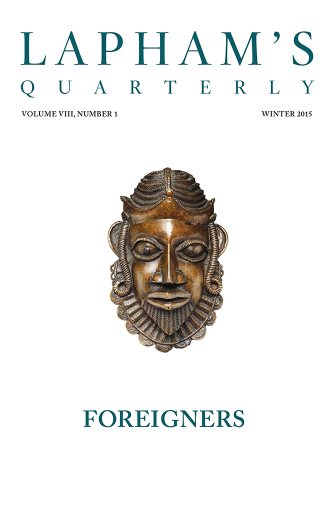Laws, like houses, lean on one another.
—Edmund Burke, 1765An Ethics of One’s Own
Edith Simcox thinks on natural law.
The subjection of man, as a conscious and rational agent no less than as a material organism, to the laws of nature consists in the fact that he is habitually bound by other powers than his own will to certain classes of actions; the sanctions which conspire with the regular action of natural causes to make the actions of men more constant than their desires are not themselves the most important element in the law, because they only take effect when a rule has been broken, or when—as in most cases contemplated by moralists—it is supposed that the will would break the rule it normally follows, but for a rational expectation that the breach of the rule would entail consequences which the will is not prepared to face.
The natural sanction of the natural law against murder is the impossibility of bringing the dead to life. A momentary act of angry violence may cause the brother who was only hated for a moment to be lost forever; hence the necessity for controlling violent impulses becomes apparent to the will, which has no abstract delight in violence and, other things being equal, from the first dawn of society, slightly prefers the life of other members of the community to their death. The natural sanction of the natural law against theft is the impossibility of two people enjoying exclusive possession of the same object at the same time, while some degree of security in the possession of needful instruments is essential to any long course of rational action toward ends such as civilized life is principally made up of. The natural sanction of the natural law in favor of veracity is the impossibility of sustained intercourse without reciprocal trust. The natural sanctions enforcing personal sobriety are self-evident. The natural sanction of the obligation of parents to provide for their children is the simple fact that infants perish if not supplied with food and shelter; and when the instinctive tendency of animals to nourish their young (without which no brute species would live through two generations) has been so far weakened among men that the alternative of deliberately destroying children inconvenient to rear can be entertained and adopted, the sanction operates with respect to the children whom it is determined to preserve.
It has been doubted by some secular moralists whether there is any natural sanction enforcing the law by which monogamy is prescribed, as we find historically that it has been in most states possessing an advanced and balanced civilization. William Godwin, whose Political Justice contains, under the head of “Inferences from the Doctrine of Necessity,” much admirably humane and rational morality, proposed to abolish marriage altogether, and as society is almost unanimous in thinking Godwin ill-advised on this point, one of the strongest of the argumenta ad hominem commonly used against freethinking refers to a supposed connection between theological and conjugal infidelity.
Edith Simcox
From Natural Law. A Victorian scholar and social reformer who fashioned in this work a comprehensive system of personal ethics, Simcox worked days at a shirt-making cooperative she cofounded in 1875 to employ women in favorable working conditions. One customer was George Eliot, whom Simcox had met while reviewing Middlemarch upon its 1872 publication and become infatuated with “lover-wise”—so much so that she kept a journal for twenty-four years in which she recorded the turmoil of her unrequited feelings. She died in 1901.

